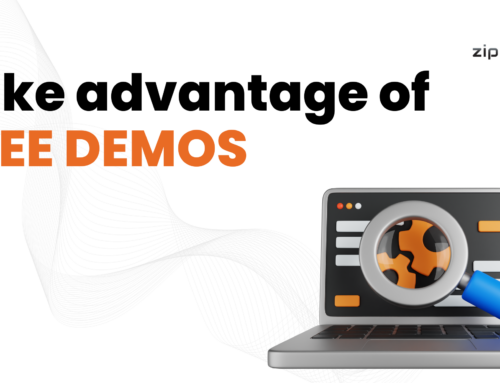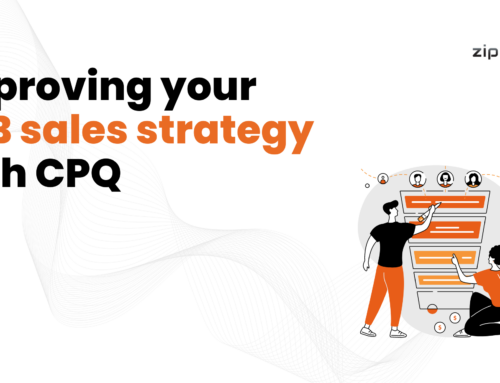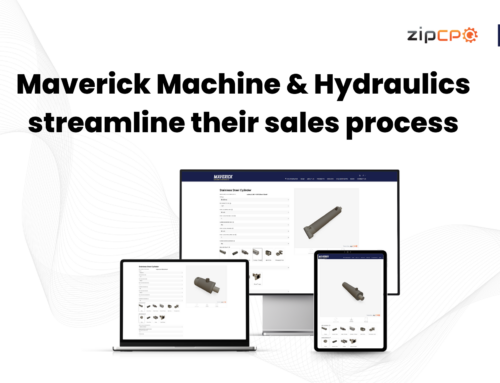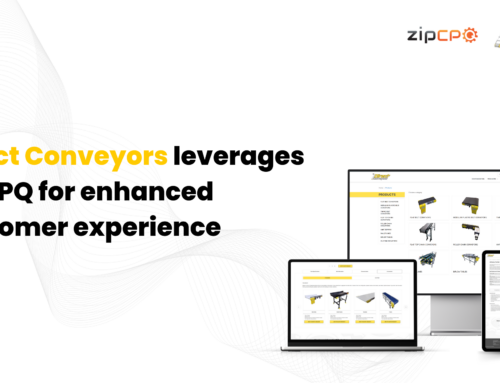Spreadsheets are an essential tool to do basic calculations for simple configurations. Any employee with some training can master spreadsheets for sales processes. While this simplicity is one of the powerful features of a spreadsheet, it can also be very tricky.

Let’s check out some differences between CPQ solutions and spreadsheets.
Complexity and Flexibility
- Spreadsheets: Spreadsheets can quickly become complex and unmanageable, especially as your product catalog, pricing options, and quoting rules grow. Customizing formulas and managing intricate calculations can be time-consuming and prone to errors.
- CPQ: A modern CPQ solution simplifies complex quoting processes by automating calculations, product configurations, and pricing rules. It offers a user-friendly interface where sales reps can easily configure products, select options, and generate accurate quotes within minutes, regardless of the complexity.
Data accuracy and consistency
- Spreadsheets: Maintaining data accuracy in spreadsheets can be challenging, particularly when multiple users are involved. Manual data entry, copying, and pasting increase the risk of errors, inconsistencies, and outdated information across various quoting documents.
- CPQ: With a good CPQ solution, you centralize and automate your product data, pricing, and business roles. This ensures data accuracy and consistency throughout the quoting process. All quotes instantly reflect product information or pricing changes, eliminating the risk of outdated or conflict data.
Quote generation and efficiency
- Spreadsheets: Creating quotes in spreadsheets requires manual data entry, formatting, and document assembly. This process is time-consuming, prone to errors, and needs more consistency in branding and formatting. Without a CPQ solution, it will take you 73% more time to produce a quote or proposal
- CPQ: CPQ solutions enable rapid quote generation with automated templates and customizable workflows. Sales reps can quickly generate professional-looking quotes consistent in branding, formatting, and pricing. By eliminating manual tasks, CPQ frees up valuable time for the sales team to focus on selling and building customer relationships. A CPQ solution shortens the sales cycle by up to 28%.
Visibility and analytics
- Spreadsheets: Extracting meaningful insights from spreadsheet data can be challenging. Tracking quote history, analyzing sales performance, and identifying trends require manual effort and complex formulas.
- CPQ: A CPQ solution provides real-time visibility into your quoting process, allowing you to track quote metrics, conversion rates, and win-loss analysis. Advanced analytics and reporting features enable data-driven decision-making, helping you identify sales trends, optimize pricing strategies, and drive revenue growth.

The ease of use that spreadsheets provide brings a bit of cost and risk to the business.
- Spreadsheets take-up time
Delivering an accurate quote can become a winning deal. Using a spreadsheet for a configuration, price, and quote process can take almost 30% longer.
- Errors
Using spreadsheets to create customized quotations can take hours and hours of manual typing. This tedious task can cause many errors, especially if minor, unnoticeable changes are made.
- Lacking reliability
When you tailor a quote to meet unique quality leads, it can be an unmanageable process that requires frequent testing.
- No feedback
Creating a static PDF gives you no indication of any changes. You may need help with different versions and copies.
- Wasting time
Your sales team is spending time managing data in spreadsheets, which leaves them no time to focus on the customer.
Still, Spreadsheets are a valuable tool for business!
Having an automated and consistent CPQ process brings a lot of benefits, but sometimes it’s easier to use spreadsheets:
- When you want to provide a quick solution for data review.
- Spreadsheets offer a straightforward approach to significant updates and applying formulas for basic changes.
- Sales reps work with familiar tools, making it easier for them to use their formulas and analytics.
- Testing different pricing scenarios.
- Using templates to reduce training time.
- Faster adaptations to market by upgrading existing templates.
- Extracting and modifying records.
- Migrating, filtering, and sorting data.
- Spreadsheets come in handy for offline data processing.
Although spreadsheets take time with manual quoting and data managing, they are very useful when you need simple and easy fixes. You can continue working with spreadsheets and use CPQ to automate tedious tasks. Using both tools simultaneously can have a positive impact on your sales process.
Conclusion
While spreadsheets have been a staple in sales quotes, they are not enough to manage complex product configurations, ensure data accuracy, streamline workflows, and provide actionable insights. Adopting a modern CPQ solution empowers your sales team with efficiency, accuracy, and a streamlined quoting process, ultimately driving higher sales productivity and improved customer experience. Combining the CPQ solution with your spreadsheets ensures that you work in a familiar environment but automate and accelerate your sales process.
Want a CPQ solution to help you with your spreadsheets?
Check out zipCPQ! zipCPQ is a cloud-based configure, price quote application fit for companies with configurable products or products for which 3D product data adds value to the customer journey. Helioz clients achieve the best digital customer experience and improve their sales by making it easier for their customers to buy from them.
We look forward to bringing zipCPQ to you and your company!




